

{sciences²} Couv encode Le 6 septembre, la revue scientifique Nature a publié une exceptionnelle série d’articles relatant les résultats du programme Encode : Encyclopedia of DNA Elements (1).
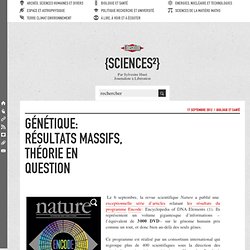
Ils représentent un volume gigantesque d’informations – l’équivalent de 3 000 DVD – sur le génome humain pris comme un tout, et donc bien au-delà des seuls gènes. Ce programme est réalisé par un consortium international qui regroupe plus de 400 scientifiques sous la direction des principales universités américaines (Harvard, Stanford, MIT…) et des instituts nationaux de la santé (NIH), organismes de recherche en biomédecine aux Etats-Unis. Lancé en 2003, il monte en puissance. Quel est le sens de cette nouvelle exploration de notre génome ? Most of what you read was wrong: how press releases rewrote scientific history. This week, the ENCODE project released the results of its latest attempt to catalog all the activities associated with the human genome.
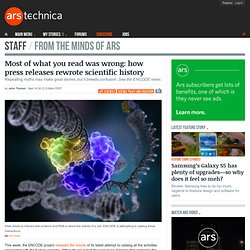
Although we've had the sequence of bases that comprise the genome for over a decade, there were still many questions about what a lot of those bases do when inside a cell. ENCODE is a large consortium of labs dedicated to helping sort that out by identifying everything they can about the genome: what proteins stick to it and where, which pieces interact, what bases pick up chemical modifications, and so on.
What the studies can't generally do, however, is figure out the biological consequences of these activities, which will require additional work. Most of what you read was wrong: how press releases rewrote scientific history. AskScience Special AMA: We are the Encyclopedia of DNA Elements (ENCODE) Consortium. Last week we published more than 30 papers and a giant collection of data on the function of the human genome. Ask us anything! : askscience. Blinded by Big Science: The lesson I learned from ENCODE is that projects like ENCODE are not a good idea.
When the draft sequence of the human genome was finished in 2001, the accomplishment was heralded as marking the dawn of the age of “big biology”.
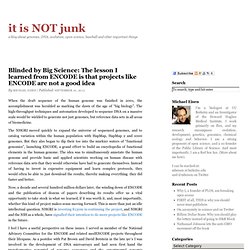
The high-throughput techniques and automation developed to sequence DNA on a massive scale would be wielded to generate not just genomes, but reference data sets in all areas of biomedicine. The NHGRI moved quickly to expand the universe of sequenced genomes, and to catalog variation within the human population with HapMap, HapMap 2 and 1000 genomes. But they also began to dip their toe into the murkier waters of “functional genomics”, launching ENCODE, a grand effort to build an encyclopedia of functional elements in the human genome. The idea was to simultaneously annotate the human genome and provide basic and applied scientists working on human disease with reference data sets that they would otherwise have had to generate themselves.
I feel I have a useful perspective on these issues. I offer up an example from my own lab. Cryptogenomicon » ENCODE says what? So I read in the newspaper this week that the ENCODE project has disproven the idea of junk DNA.
I sure wish I’d gotten the memo, because this week a collaboration of labs led by myself, Arian Smit, and Jerzy Jurka just released a new data resource that annotates nearly 50% of the human genome as transposable element-derived, and transposon-derived repetitive sequence is the poster child for what we colloquially call “junk DNA”. The newspapers went on to say that ENCODE has revolutionized our understanding of noncoding DNA by showing that far from being junk, noncoding DNA contains lots of genetic regulatory switches. Well, that’s also odd, because another part of my lab is (like a lot of other labs in biology these days) studying the regulation of genes in a model animal’s brain (the fruit fly Drosophila). We and everyone else in biology have known for fifty years that genes are controlled by regulatory elements in noncoding DNA.
On The Neutral Sequence Fallacy « I wish you'd made me angry earlier. Beginning in the late 1960s, Motoo Kimura overturned over a century of “pan-selectionist” thinking in evolutionary biology by proposing what has come to be called The Neutral Theory of Molecular Evolution.
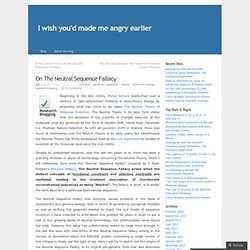
The Neutral Theory in its basic form states that the dynamics of the majority of changes observed at the molecular level are governed by the force of Genetic Drift, rather than Darwinian (i.e. Positive) Natural Selection. As with all paradigm shifts in Science, there was much of controversy over the Neutral Theory in its early years, but nevertheless the Neutral Theory has firmly established itself as the null hypothesis for studies of evolution at the molecular level since the mid-1980s. Despite its widespread adoption, over the last ten years or so there has been a worrying increase in abuse of terminology concerning the Neutral Theory, which I will collectively term here the “Neutral Sequence Fallacy” (inspired by T. #ENCODE : La revanche du retour du fils du génome humain.
Cliquez sur l’image En 2001, des équipes de chercheurs ont publié deux versions de la séquence du génome humain.

A l’époque on a comparé cela à poser un homme sur la Lune. Rétrospectivement, c’était plutôt Spoutnik : la preuve que c’était possible d’aller là-bas, mais on n’y était pas encore. Cette semaine, un nouveau consortium a publié une série de papiers assez incroyables du project ENCODE, qui vise à comprendre en détail exquis tout le fonctionnement de ce génome. Je vais dire que c’est notre moment Gagarin. Il y a une kilochiée de données là-dedans, et comme tout le monde ça va me prendre un peu de temps pour digérer tout ça. D’abord quelques chiffres : ENCODE c’est 440 chercheurs dans 32 labos dans le monde30 articles publiés le même jour1’600 types d’expériences sur 147 types de tissus (tissu au sens « tissu musculaire »), portant pour la plupart sur les 3 milliards de bases du génome humainAu final 15 Tb de données.
Réponse courte : test de l’oignon. Comme dit sur Twitter : The ENCODE Data Dump and the Responsibility of Science Journalists. ENCODE (ENcyclopedia Of DNA Elements) is a massive consortium of scientists dedicated to finding out what's in the human genome.
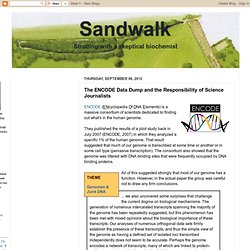
They published the results of a pilot study back in July 2007 (ENCODE, 2007) in which they analyzed a specific 1% of the human genome. That result suggested that much of our genome is transcribed at some time or another or in some cell type (pervasive transcription). The consortium also showed that the genome was littered with DNA binding sites that were frequently occupied by DNA binding proteins. Genomes & Junk DNAAll of this suggested strongly that most of our genome has a function. However, in the actual paper the group was careful not to draw any firm conclusions. ... we also uncovered some surprises that challenge the current dogma on biological mechanisms. This didn't stop the hype. I don't blame science journalists for this. THEME:TranscriptionOther scientists expressed skepticism over the interpretation of the ENCODE pilot project result. This is 2012. L’Encyclopédie ENCODE : coup de génie ou coup de pub ? Vous avez probablement entendu le buzz du web ou remarqué la soudaine augmentation d'articles autour du projet ENCODE (décodage du génome humain et de ses éléments fonctionnels).
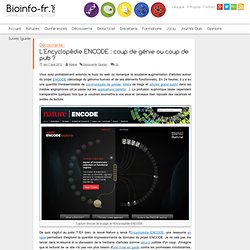
En 24 heures, il y a eu une quantité invraisemblable de communiqués de presse, billets de blogs et articles grand public dans les médias anglophones (et je passe sur les applications tablette...). La profusion euphorique laisse cependant transparaître quelques hics que je voudrais soumettre à vos yeux et cerveaux bien reposés des vacances et avides de lecture. ENCODE : Nature Publishing Group : A landmark in the understanding of the human genome.